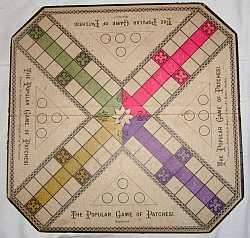Pachisi
Ludo
Parcheesi
Parques
Parchis
Patolli
Chaupar
Other
About
Links
|
|
Parcheesi
| Parcheesi is an American adaptation of the
Indian game Pachisi. It has somewhat contemptuous been described as an
westernized, simplified and less skillful version of Pachisi, and only
suited as a family or children's game.
But as Parlett (1999, pg.48) says:
"Parcheesi...is of all western derivatives the least divergent from its
Indian model". It is a all-against-all game (versus Pachisi partnership
game1), but does include blockading and safety
zones.
It's early history in the USA is shrouded in fog and uncertainty.
Several sources contradicts each other2.
|
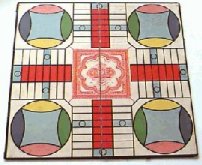
Selchow
& Righter Co. Parcheesi board 1934
|
But there is
evidence for home-made boards and boards without a clear origin from
the 1850s. A story credits Sam Loyd as the inventor of Parcheesi, but
this is very doubtful. Mr. Loyd is known as a notorious self-publicist
and deciever.
The earliest
trustworthy information is that John Hamilton of the Hudson
River Valley claimed copyright to the game in 1867. This
version was called Patcheesi. The name was changed
to Parcheesi in 1869 (by Hamilton) or 1868 (by
Swift). The rights were sold to Albert Swift (a New York
fancy-goods manufacturer) in 1868 (another source says
1867...), who in 1869 (or 1870) sold the rights to
game manufacturer E.G. Selchow & Co (New
York City). Parcheesi was first published around 1870. They copyrighted
and trademarked the name of the game again in 1874 since they merged
with John Righter and become Selchow and
Righter Co.
Today Hasbro
Inc. owns the rights to Parcheesi for the North American
market.
From: Wikipedia article as of
01.01.2006. The Wikipedia
article included below is licensed under the GNU
Free Documentation License (GFLD)
Rules
Parcheesi is played with two dice and the goal of the game is to take
each of four colored pawns to the center square.
The Parcheesi board has sixty-eight squares in all. Sixteen of these
are safe squares (squares where one's pawn cannot be "eaten" -- forced
to return to start -- by an opponent's). A pawn that does catch up to
an opponent's pawn on an unsafe square "eats" it and then continues the
rest of the player's turn. When a player sends another player's pawn
back to its nest, that player gains 20 points that he may move with
only one of his pawns.
Five has a special value in this game because it serves to get pawns
out of the nest where they begin the game. When a five is tossed, the
player can get a pawn out of the nest and begin to move around the
board. With double fives, a player can get two of them out. It is not
possible to place more than two pawns in the same square.
Two of a single player's pawns can form a blockade when they share the
same space. It is destroyed when one of the two pawns moves or when
there is no other way to move for any pawn than by passing over the
blockade.
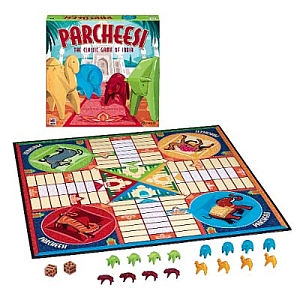 When
a doublet (pair) is tossed, the player gains an extra turn. In
addition, if all the pawns are outside the nest, the values below the
dice can also be used. For example, a player who rolls 6-6 can also
move 1-1 with either the same pawns or different ones. With two pawns
on the board, a player can move 7 with one pawn and 7 with another one.
With three pawns a player can move 6-1-7, and with 4 a player can move
6-6-1-1. Therefore, with this type of play, the player always moves one
or more pawns a total of fourteen spaces. If all of the 14 cannot be
used, the turn is forfeited. A player with 3 consecutive doublets can
automatically take a pawn to the center square. When
a doublet (pair) is tossed, the player gains an extra turn. In
addition, if all the pawns are outside the nest, the values below the
dice can also be used. For example, a player who rolls 6-6 can also
move 1-1 with either the same pawns or different ones. With two pawns
on the board, a player can move 7 with one pawn and 7 with another one.
With three pawns a player can move 6-1-7, and with 4 a player can move
6-6-1-1. Therefore, with this type of play, the player always moves one
or more pawns a total of fourteen spaces. If all of the 14 cannot be
used, the turn is forfeited. A player with 3 consecutive doublets can
automatically take a pawn to the center square.
When a pawn enters the arrival square by exact count, the player gains
10 points that can be used to move one pawn. If this cannot be done
with the pawns remaining on the board, the points are lost.
Other Pachisi/Parcheesi variants made and
marketed in the USA:
| Game Of
India :
Several companies made this variant
-
"Pachesi" Woolson Spice Co. (Toledo, OH)
around 1894.
"Parchesi - A Game of India" (Whitman Co. (Racine, WI) 1939
"Pachisi - The Game of India" The National Games Co
. (Portland, OR) about 1940.
"Game of India" (Milton Bradley, 1901/1910).
All of these versions of the game use standard dice as the "chance"
device.
|
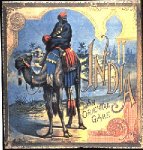
Picture from 1936 -
Milton Bradley Company
|
| Pollyanna :
A Pachisi variant based upon the novel
Pollyanna by Eleanor H. Porter (1913).
Made by Parker Brothers.
The board uses pictures of characters from
the book.
|

|
| AL DJEMMA
:
A variation with a Middle Eastern theme
(Nathan Reinhertz, Corey Games, 1944).
Source and image: Abstract Strategy
|
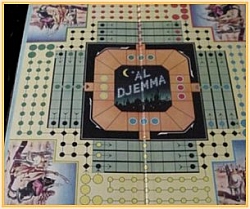
|
| WA HOO
A proprietary race game that resembles
Pachisi and Aggravation. The earliest known WAHOO boards are from 1962.
Popular in Texas and Oklahoma.
The name resembles an American Indian war
cry and the board is printed with Indian braves and teepees.
Rules available at Traditional
Game & Toy Co.
|
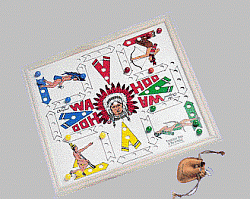
|
| Sorry!
A variant first made in 1934 (Waddingtons,
UK) (or 1932?). Licensed to Parker Brothers. Instead of throwing a a
dice, you draw cards. The 45 playing cards specify distance, bonuses
and penalties. The original cruciform track is replaced with a
peripheral square track. 4 player game.
Image from UncleGames.
Rules available at Central Connector
|

|
Aggravation (1962, see other)
Notes:
1. The earliest sets
of Selchow & Richter's Parcheesi do mentions partnership games
(two against two), but only as an option. This option disappeared
quickly (Saunders 25,1999, p. 550)
2. For the full
history of the contradicting sources; see Saunders (25,1999, p. 546-547)
Online sources:
Elliot
Avedon Museum and Archive of Games - Web exhibition: Classic American Games (B.
Whitehill)
Randy Rasa's site Board Game Central
Printed sources:
- Parlett, David: The Oxford
history of Board Games, Oxford
University Press, 1999. ISBN: 0-19-212998-8
- Saunders, Wayne: WAHOO Hullabaloo. In: All
in the Game, March 2003
- Saunders, Wayne: The Great American Indian, part II: The West takes
Pachisi. In: Game Times, 25, dec. 1994
- Whitehill,
Bruce: Games: American boxed games and their makers 1822-1992,
Wallace-Homestead Book Company : Rednor, Pennsylvania, 1992, ISBN:
0-87069-583-5
|
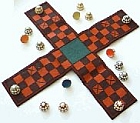

 When
a doublet (pair) is tossed, the player gains an extra turn. In
addition, if all the pawns are outside the nest, the values below the
dice can also be used. For example, a player who rolls 6-6 can also
move 1-1 with either the same pawns or different ones. With two pawns
on the board, a player can move 7 with one pawn and 7 with another one.
With three pawns a player can move 6-1-7, and with 4 a player can move
6-6-1-1. Therefore, with this type of play, the player always moves one
or more pawns a total of fourteen spaces. If all of the 14 cannot be
used, the turn is forfeited. A player with 3 consecutive doublets can
automatically take a pawn to the center square.
When
a doublet (pair) is tossed, the player gains an extra turn. In
addition, if all the pawns are outside the nest, the values below the
dice can also be used. For example, a player who rolls 6-6 can also
move 1-1 with either the same pawns or different ones. With two pawns
on the board, a player can move 7 with one pawn and 7 with another one.
With three pawns a player can move 6-1-7, and with 4 a player can move
6-6-1-1. Therefore, with this type of play, the player always moves one
or more pawns a total of fourteen spaces. If all of the 14 cannot be
used, the turn is forfeited. A player with 3 consecutive doublets can
automatically take a pawn to the center square.




